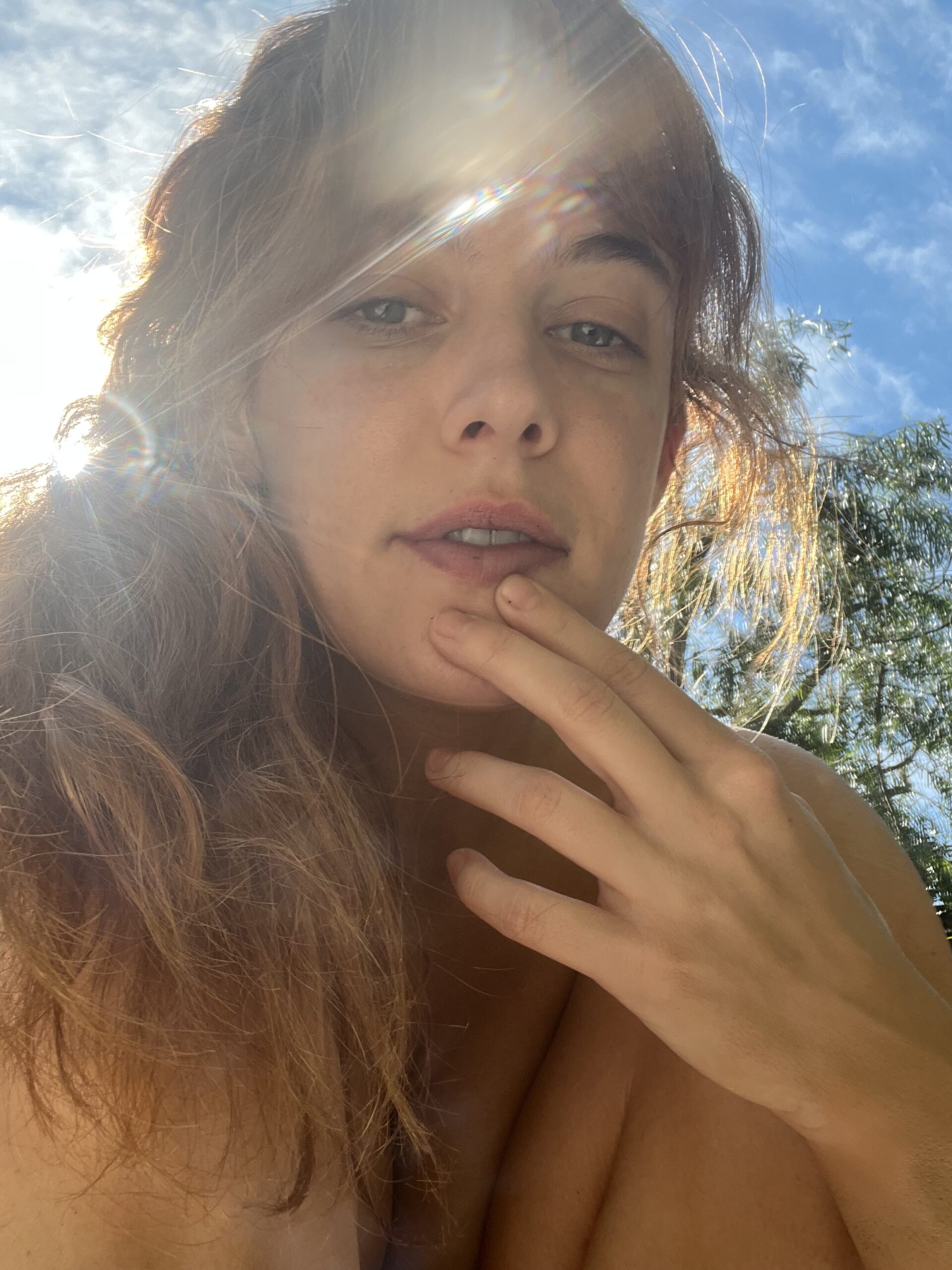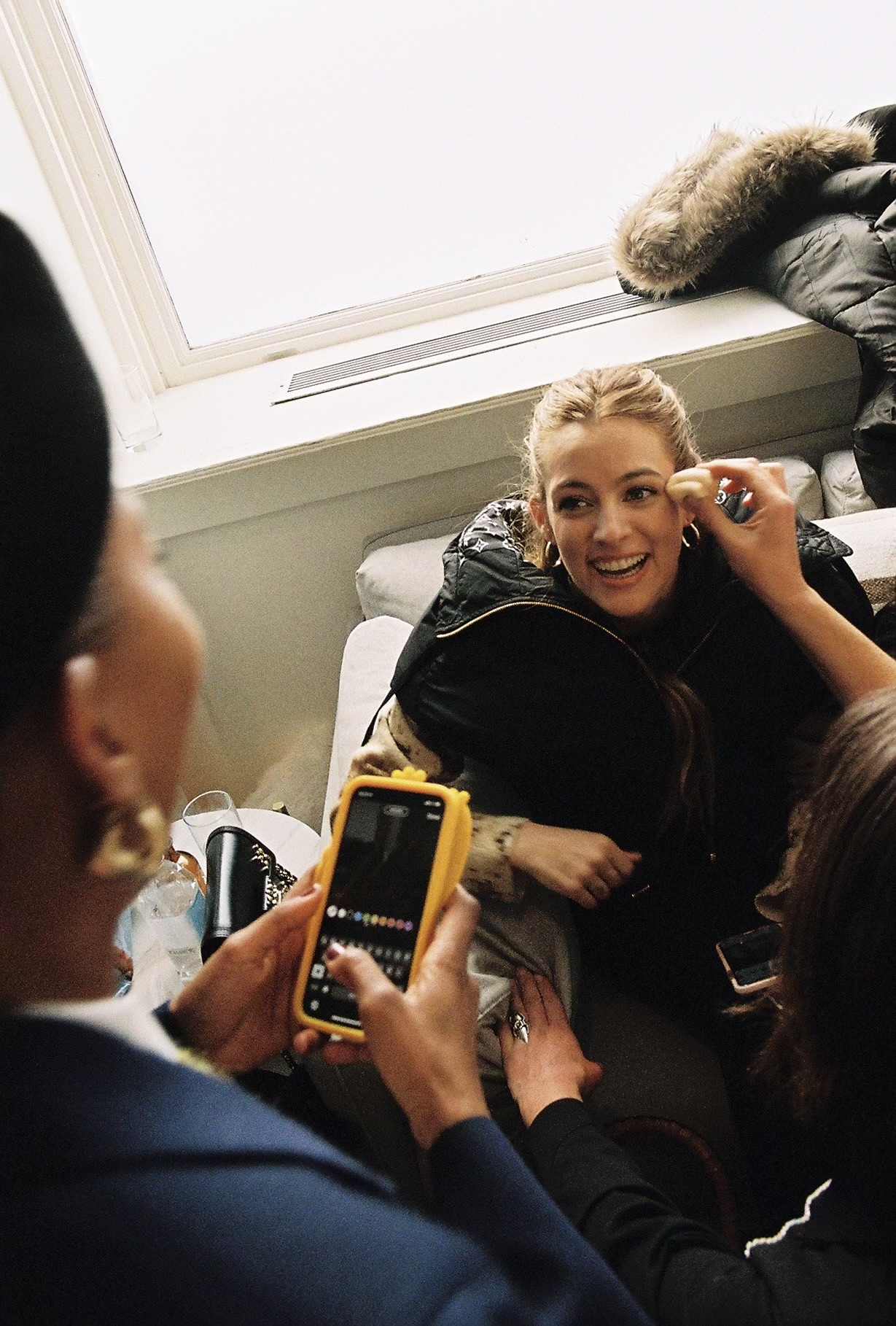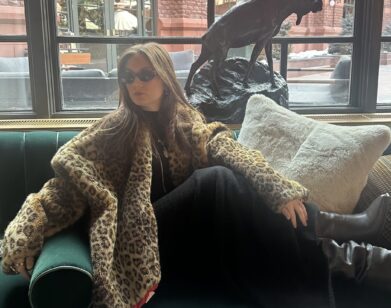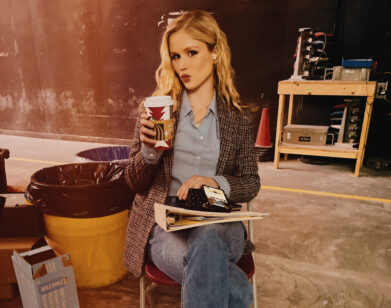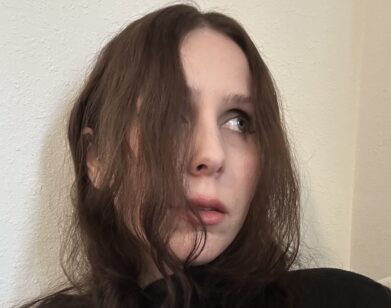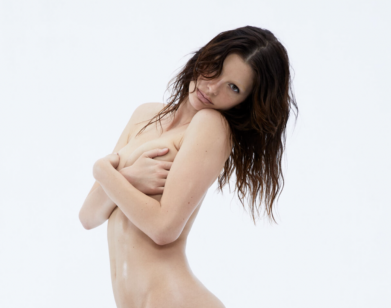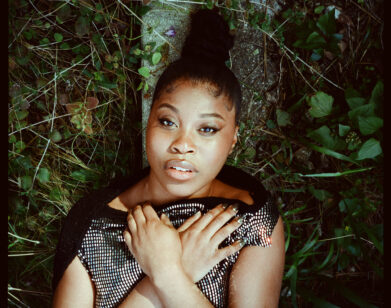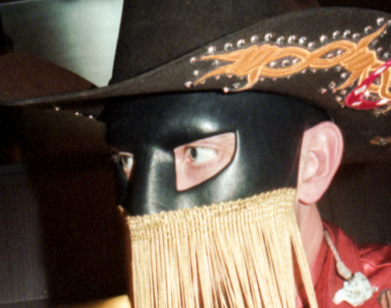IN CONVERSATION
Riley Keough and Janicza Bravo Talk Family, Filmmaking, and Feet
If you’ve been on any form of social media lately, then you already know Daisy Jones. The titular character in Amazon’s new limited series, Daisy Jones & The Six, a musical drama based on Taylor Jenkins-Reid’s book about a Fleetwood Mac-style rock band in the 1970s, was primed to go viral: her wild red hair, the band’s tragic love triangle, Jones’s Laurel Canyon wardrobe of classic bell bottoms and sheer caftans. But when Riley Keough stepped onstage as Daisy Jones, swaggering and self-assured while performing, if less so in her real life, it was clear that Daisy would be more than just Tik Tok’s latest obsession. It would’ve been easy for the actress to play a cliche—Stevie Nicks in a sex, drugs, and rock ’n’ roll tragedy. But instead, Keough embodied all sides of Daisy—the striving poet, the wounded rock star, the sexy siren—and, in doing so, showcased the complexity of being a woman. It’s a theme that runs through much of her work, in part because of how much she transforms into her characters. “You really leave you at the door,” said filmmaker and Keough’s Zola director Janicza Bravo, in a recent Zoom conversation with the actress. “When I’m watching you I have to tell myself, ‘You do know that person,’ because you really do disappear into what you’re doing.” For the next hour, the two friends talked about how Keough became Daisy Jones— from discovering the perfect Lynyrd Skynyrd song for her audition to ditching her Valley Girl accent. Along the way, they discussed grief, feet, and Elvis, too.—ALEXANDRA WEISS
———
JANICZA BRAVO: Hi, honey.
RILEY KEOUGH: Hi, I’m glad I get to finally see you.
BRAVO: I know, I was kind of sad that we didn’t get to hang out on Saturday, but I understood that life was life-ing.
KEOUGH: Life was life-ing and I didn’t want to push it late when you had to pack all your stuff and everything. Are you in L.A. now?
BRAVO: I’m still in LA. I leave next Saturday. But you’re not asking me questions, I’m asking you. So, where are you? Because the art behind you doesn’t feel like your personality.
KEOUGH: I’m in a rental house in Vancouver.
BRAVO: And why are we in Vancouver?
KEOUGH: Because Gina [Gammell] and I are up here shooting a Hulu series called “Under the Bridge,” which is the first series that we’re producing, which has been fun.
BRAVO: And who is Gina? For the reader who doesn’t know.
KEOUGH: For the reader, Gina is my producing partner and writing partner.
BRAVO: And you two started a production company together called Felix Culpa.
KEOUGH: I love your pronunciation.
BRAVO: Did I pronounce that right?
KEOUGH: I have no idea.
BRAVO: Well it’s Spanish. Is it Spanish or is it Latin?
KEOUGH: Latin.
BRAVO: So, tell us a little bit about Felix Culpa.
KEOUGH: Well Gina and I started writing together in our early twenties and then, I don’t know… We always knew we wanted to make films together. And then it became more serious, and we started raising money, and actually coming up with a plan, and then developed our company.
BRAVO: I feel it’s also worth noting, even though I know we’re going to get to Daisy Jones. But War Pony, which is the first feature that your company made — or the first feature made under the banner of your company that both of you directed — premiered at Cannes last year and just this week was also at South By [Southwest].
KEOUGH: Yeah, it was crazy. It’s been a really interesting experience. That was the first time we’ve played in the States and it was kind of stressful. The story takes place in America. It’s an Indigenous Native American story. So, it was a little nerve-wracking playing it in America to be honest.
BRAVO: I need your PBS. What is the roots show called? This is terrible. I can’t believe this. It’s like Uncovering Your Roots. It’s definitely not called that. Do you know what I’m talking about?
KEOUGH: No.
BRAVO: You don’t? It’s the roots PBS show. I have to look it up while we’re here. It’s literally just called Finding Your Roots.
KEOUGH: Like a documentary series?
BRAVO: Yeah, it’s Henry Louis Gates and basically it’s a 23andMe. But deep. And sexier.
KEOUGH: I think there are a lot of people who don’t want to go on that show.
BRAVO: Because they’re all slave owners?
KEOUGH: Yes.
BRAVO: I think you would have a really good one.
KEOUGH: One cool thing about being Elvis’ granddaughter is a lot of our family history is very firmly documented. And I was just somebody who was totally obsessed with heritage and where my family came from. And we have so much of it in archives and it’s so cool to have all of this information that other people found.
BRAVO: That’s the one cool thing?
KEOUGH: That’s the one cool thing. There’s a few other cool things. But so, my dad’s side of the family — I love that this is just turned into a 23andMe interview.
BRAVO: This is going to be about Daisy Jones, but I’m also going to ask you about your feet.
KEOUGH: I know you’ll land the plane.
BRAVO: But now we’re talking about your dad.
KEOUGH: Yeah, so my dad’s mom was very into family history too. So, on both sides, I have a crazy amount of information, which I just find so fascinating.
BRAVO: I think I remember ahead of you going to Cannes, we had talked, and I think I had floated the idea of, “What is the climate of releasing a film like that in Europe?” Because Europe can be very curious with its relationship to language and race. But you’d actually had a great experience.
KEOUGH: Yeah, and the story of making the film is that it was a very collaborative process. If anything, it felt like we were doing this sort of experimental thing that none of us ever anticipated would end up being a real movie. I think everyone involved will say we didn’t actually think this would turn into a real movie. It was just this fun thing that we did in our early twenties with our friends in Pine Ridge. So, in hindsight, I wouldn’t choose to direct a very Indigenous film now at this stage in my life. But I don’t think we anticipated that it would even be a film, you know what I mean?
BRAVO: Yeah.
KEOUGH: But we just kept going and then we had a script, and then people responded positively. It just became, “How do we do this? How do we make a film on the res and what can we learn and what can we share with other people in terms of what didn’t work and what did?” And it was certainly difficult. There were a lot of challenges that came with going into a community and filming there. But so many filmmakers are doing that every day.
BRAVO: All the time. I would say the big difference is that from the jump, both you and Gina were incredibly conscious of not centering yourselves. And I think your sensitivity around it is that you recognize that narratively, our industry is going to gravitate towards the spiciest piece, and you’re aware, as an actor, that whether or not you mean to center yourself, the industry is going to center you.
KEOUGH: Totally. And it’s also just a topic that more generally needs help—filmmakers going into a community and pulling stories out, then just going, “See you later.” It needs to be done more sensitively. But at the end of the day, we had a beautiful experience that was really created in love. It wasn’t for Cannes or South By. It just ended up there. And I think that sometimes, that’s the best way to experience things, because I think the few times in life where I’ve been genuinely grateful and shocked is when I have zero anticipation of the outcome. Submitting to Cannes was a joke to me. I was like, “Yeah, might as well.”
BRAVO: But then you won an award, so…
KEOUGH: An award, yeah. I know. And then at South By, it was just really beautiful. There’s American nuance here that was interesting to feel in the room, and humor and moments that played in America that I wouldn’t have anticipated. Then we got a little standing ovation, which was really sweet. Overall, I’d give it a four star experience.
BRAVO: Four out of five stars?
KEOUGH: No, five out of five.
BRAVO: Five out of five. On a scale of one to 10, where are you right now? Your current state, your current spirit?
KEOUGH: Is 10 the best?
BRAVO: Yeah, 10. You know when you go to the doctor and they show you a pain chart? Zero, which I think is a green face, is no pain, and then 10 is a red face and it looks swollen, it’s really upset.
KEOUGH: Okay, so zero is the best. I think I generally wake up at zero and then by around 4:30 I’m at like nine.
BRAVO: Life lifes at you?
KEOUGH: Yeah.
BRAVO: I’m going to pivot into Daisy Jones, which is what this is supposed to be about. There is this line in the first episode, it’s maybe kind of a throwaway, but I thought it would be a nice place to start. It’s this piece of voiceover where you say, “I was 15 years old and the whole world seemed so beautiful and good.” And I’m sure you remember this moment, because as I was watching it, my reaction was that it was so lovely to see you be in a character that had so much wonderment, even if at the back of your eye, there is always a little bit of tragedy, which is like, to me, the hottest thing about you — that you always feel a little broken. But still, you were experiencing her through so much wonderment. So when I heard that line—obviously there’s a real page turn where something really fucked up has happened—but it seemed to be the seed from which that character was born.
KEOUGH: It’s really interesting you say that because I’ve said that in a couple of interviews.
BRAVO: You have?
KEOUGH: Yeah, but no one’s come at me with it. Of course, it’s you! For me, the thing that I wanted to try and carry through her story was that she doesn’t ever lose that sort of wonderment. In the book and in the script, she’s an incredible character, and she’s wild, and she’s rock and roll. But I like getting the chance to figure out where she started from. I actually read a letter someone sent me that Janice Joplin had written to her parents and she died shortly after the letter, I think. It was like, “You gotta see this, mom, and oh my god, dad, this has happened and we’re playing at this venue.” It was like a child wrote it. That’s something I identify with as well. I have days where it’s harder, but for the most part, that’s something that’s really important to me—to try and keep that alive.
BRAVO: Yeah, I felt her experiencing newness. If I didn’t know anything about you or the show, how would you describe Daisy Jones & The Six?
KEOUGH: I would say, it’s about a band in the 1970s who becomes the biggest band in the world. At the center of it, there’s a bit of a love triangle, and then ultimately, they break up and it’s very dramatic. So, it’s sort of the rise and fall of this fictional band in the ’70s, I guess.
BRAVO: I was surprised that my takeaway upon completion was that it was more about family than I thought, and not only the family we’re born into, but the family that we make once we leave our homes. The group feels like family and the band feels like family, but you all as a cast also feel like a family. You feel quite tethered. I wondered if having almost made [the show] in 2020 and then basically waiting two more years to make it, if that’s something that I’m feeling in watching?
KEOUGH: I think it ended up happening at the perfect time in all of our lives, and specifically mine. When we were with Zola at Sundance, I was supposed to go home and start shooting a month later, but then the pandemic happened.
BRAVO: Did you bring the COVID that you had at Sundance to the Amazon show?
KEOUGH: The amazing thing is, I got sick at Sundance and then I had to go right into chemistry reads.
BRAVO: I remember. We went to a hospital.
KEOUGH: In hindsight, it may have been COVID, but then I had to do chemistry reads with the actors for Daisy the next week and I was so sick. I felt so bad for these poor actors having to act with me, because I had an oxygen tank.
BRAVO: I like the thought that people don’t get the part, but they do get COVID.
KEOUGH: I felt like the worst! It was awful. But there’s three projects where I’ve actually made real friends: Mad Max, Zola, and Daisy Jones.
BRAVO: Have you made enemies on all your other films?
KEOUGH: Every other film, I have enemies, yes. Find one person who says they don’t like me, I challenge you.
BRAVO: They don’t exist!
KEOUGH: But I think that there’s so much truth in that, as far as finding these little families at work and how comforting that is. After my brother died, we shot this movie. We were supposed to shoot it in 2020 and we ended up shooting it a year or so after I lost my brother. It was my first time back at work, and it was such a gift in that way because it was really joyous and felt like sort of a sanctuary for me. I felt so grateful that it came at the time that it did, because any earlier, I think I wouldn’t have been able to give anything because I was going through so much. Daisy Jones was the best scenario I could have ended up in that year in terms of the people I was surrounded by, and it was really fun getting to do band rehearsal all day.
BRAVO: So you were supposed to shoot it in 2021, and then you lose your brother. Do you also become a mother in this window?
KEOUGH: I’ve never talked about this in an interview. Do you want the exclusive? It’s going to go viral.
BRAVO: People know you have a baby, though.
KEOUGH: I know, yeah. I became a mother in 2022.
BRAVO: I read that you auditioned for the part and I thought it was worth discussing, because obviously, you have a very sizable resume, an extensive career, and you auditioned. I know that in our industry, when you arrive at this place, you have a page term that says you’re not supposed to audition anymore. Or the thought of being asked to audition is rude or disrespectful. So when I read that you had, I was curious.
KEOUGH: Allie Trustman, my agent, called me and said, “Hello Sunshine’s doing a project called Daisy Jones & The Six.” I think she was reading emails or something. I had no context. I didn’t know what it was, didn’t know it was a book, didn’t know it was a band. And in my mind I was like, “I’m going to be Daisy Jones.” And it could’ve been anything.
BRAVO: A garbage collector.
KEOUGH: Totally. It could have been a tap dancing group. I just had this weird feeling that I was going to be Daisy Jones. It was like a weird premonition. And then she called back and told me, “It’s a book. It’s based on a band from the ’70s.” So I Googled it and saw it was a best-selling book. I told Allie I wanted to meet on it and she was like, “It’s very early. I think they’re just going to start reading people in a few weeks.” But I just had this weird thing where I was like, “This sounds challenging.” And I know everyone says I’m Elvis’ granddaughter and obviously I can sing, but I’m not a singer. Ask anyone I grew up with. Nobody in my life would’ve ever said I was a singer. And I’ve never picked up a guitar in my life.
BRAVO: Your mom obviously made music and your dad also made music. You had never sung with them or been by the piano?
KEOUGH: Well, I played piano by ear when I was really young. I would come home from school and we had a grand piano and I would learn songs. So I have a musical ear, but I did one lesson and I was like, “I hate this. I don’t like being told what to do.” So, at the beginning it felt like a challenge. And that’s how the audition process felt to me too, because I know that for this, a large part of the audition process was singing. So they were kind of like, “You can act, but we need you to sing.” That’s why it wasn’t offensive when they said, “Can you read?” Because it was a very specific thing, where you had to be able to not just sing, but belt, and project, and sing loudly. So, I really just took it as a challenge. I like things that are hard.
BRAVO: Oh, I know you do. We’re not talking about penises, Riley. [Laughs]. But so, in the lead up to the audition, do you get a voice coach?
KEOUGH: The first thing I did was send them a video of me singing “Wild Horses” with my husband and it was very soft. They were like, “That’s nice, but she has to be able to sing.” And simultaneously, they were like, “Can she put these scenes down, so we can see her performance and her take on the character?” So I was kind of like, “Yeah, yeah, sure, but I really need to focus on singing.” And so I sent the video in and they said, “That’s great, but she has to be able to belt.” It felt like the end of the road. But Allie suggested I sing… What is that Lady Gaga song from the movie? I was like, “Are you crazy? I’m not just going to bust out a Lady Gaga song.” I was sitting in the car and I pulled over, and was like, “I’m just going to try and sing a loud song.” I probably have these on my phone, which is so mortifying. I tried to sing a song loud, but I didn’t know where to push from. It was so bad that I literally started crying in my car. I kind of gave up, but then Allie suggested I go to a vocal coach, and I was like, “Okay, I’m going to give it one more shot.” I went home and my husband, who honestly was my biggest supporter, was like, “I know you can sing, I’ve heard your voice.” All of a sudden, Lynyrd Skynyrd’s “Simple Man” came into my mind and I could kind of see how I could sing that louder. And we just kept working on it. The next day, we did it and that was the first time I really belted. Allie sent that video and they were like, “Okay, you’ve made it to the last round. Now you have to come sing for them in person.”
BRAVO: Is any part of you like, “There are tons of fucking singing movies and people fake it, what’s the problem here?”
KEOUGH: Totally, I did feel that way. But they were like, “That’s the whole thing we want to do with the show. We want to make it authentic and really have the people learn guitar, and have the singing be real.” I think they were also figuring out what their priorities were. Do we want singers as actors, or actors as singers, or someone who can do both?
BRAVO: Which you can, by the way.
KEOUGH: I mean, I was bad when I first started. I really got somewhere, and I will admit I’m proud of where I got to. But in the beginning, I was like a dying goat. I could only go up and yell and I didn’t know how to use my voice at all. That’s what’s been the most amazing thing about this—it’s not often that you get to acquire new skills in your thirties and really get a year to practice.
BRAVO: You mentioned Lynyrd Skynyrd. Were there any other references you were pulling from going into it? I think there’s an obvious one with Fleetwood Mac, but I’m curious what was on your mood board.
KEOUGH: I literally watched every single person in the ’70s I could find. I would just sit there and watch everything. I wanted her physicality to feel ’70s more than anything, and her dialect, because I have a very modern, Valley girl way of talking. One thing I really don’t ever want to fall into is using a bag of tricks or relying on things that I’ve done before. That’s the most challenging thing about acting —you see a scene that’s reminiscent of another scene and you’re like, “Well, I’m going to do this thing that I do.” With this, the more ’70s footage I had to work off, the more I was able to watch their walks, the way their arms would be, or the way they’d be on stage, or the movement.
BRAVO: It was in your gesture, your body language, the way you always had kind of like, a bend in your knees. This is more of a filmmaking question, but I think it applies to acting, as well. I love asking this question whenever I get to interview any of my friends, which is not that often. So, as a filmmaker, when you were making War Pony, there’s the film that you write, there’s the film that you shoot, and then there’s the film that you finally make, the final product. And where you end up is not necessarily where you started. I am curious, when you think about Daisy Jones as a whole, the piece that you first read, the piece that you sat with, then the piece that you got to build and rehearse on, and then the final product, is there something that comes to mind along the way that you feel grateful for?
KEOUGH: Well, I think it’s a very similar experience as a filmmaker and as an actor in that you get a script or you write one. When you’re writing, it’s much more personal, obviously, and the details are much more important, but I think that it’s a similar process in that you have the script, and then you have what’s shot, and then how it’s edited, and then the final product. And they’re not always entirely what you think they’re going to be. And I think it’s so important in this industry to have the ability to totally pivot and be okay with things changing. For Daisy, it was a really big collaboration. I’d never been so involved in wardrobe in my life, and coming up with her makeup and her looks. It was such a massive collaboration that I had never really experienced before. So, I felt really grateful for being allowed to collaborate. And I think, when you have a show like this, you have so many minds and so many opinions and so many people who have to work together. Ultimately, I feel like I’m more capable of doing that after every movie I’ve ever done, but this one particularly, because it was such a huge operation. So I feel grateful for the experience of learning to collaborate in such a different way.
BRAVO: Do you know what your current wikiFeet score is?
KEOUGH: No, it’s probably gone down, Janicza.
BRAVO: No, I just looked it up. You have five stars.
KEOUGH: I’ll tell you, I’ve been so busy, I haven’t been on top of my manicures and pedicures. I was like, “This is going to be bad for my feet people.”
BRAVO: The community is very excited, it’s five stars. And there’s a lot of new pictures from Daisy Jones as well.
KEOUGH: Well, that’s great. At the end of the day, that’s my number one priority.

